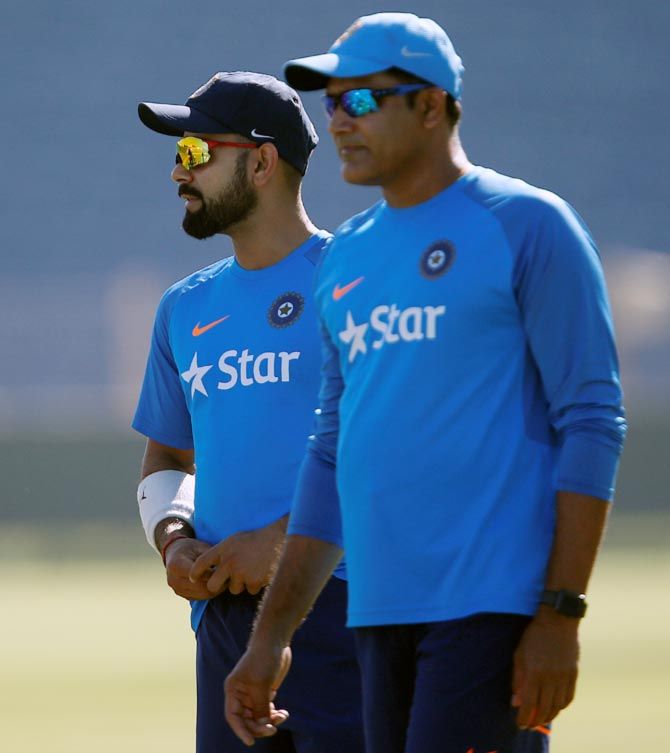The Virat Kohli-Anil Kumble fiasco proves that two power centres don't work -- whether it's Team India or Indian companies, says Shyamal Majumdar.

Gary Kirsten once termed 'outrageous' any suggestion that the Indian cricket team's coach has to play second fiddle to the captain for his survival, but admitted that the unwritten rule was very clear: It was the captain who ran the show and the coach's job was to complement and support him.
Indian cricket's most successful coach had objections to the term 'second fiddle', but knew very well that it ultimately boiled down to the personal equation and trust between the captain and the coach.
Kirsten, who has come to be considered the most hands-off and players-first coach that India has ever had, cultivated a very strong personal and professional relationship with the captain, who in turn allowed him to take on various roles of decision-making and responsibility.
Kirsten even had the liberty of having a say in the playing XI, but the shrewd coach was careful enough to step back when it came to the final say. That job was left to the captain.
Most importantly, throughout his stint as coach, Kirsten always made sure he stayed in the background and defined his role as a friendly mentor to the captain.
Ravi Shastri, who is believed to be the frontrunner for the coach's job this time round, understands this well, too.
He achieved success during his earlier one-year stint as coach by being 'one of the boys'. Shastri would always throw his weight behind the captain and was his best man of sorts.
It was a relationship that Virat Kohli had warmed up to.
Unfortunately, Anil Kumble forgot to play by that golden rule. So, his resignation was no great surprise.
The fact is Kohli himself is a strong-minded individual and decisive in his thought process. To put someone of a similar mindset in a position where he is advising the captain is inviting confrontation.
Kohli clearly believes the captain is the only person who can run a cricket team properly, because so much of the job involves on-field decision making.
It's not only about Kohli; coaches can succeed only if they are in the captains' good books.
As ex-cricketer Madan Lal said, 'They need coaches who keep quiet. People like John Wright and Gary Kirsten never spoke a word, they basically handled the 13th, 14th and 15th players and didn't touch others.'
Kohli isn't alone. Sourav Ganguly was instrumental in getting Greg Chappell the job in 2005, but fell out with him later. It was, in fact, a toxic relationship.
The first round of the battle was won by Chappell who declared that Ganguly was mentally and physically not fit to lead the side, following which the latter was removed from captaincy as well as the team.
However, while Ganguly made a comeback in both ODIs and Tests, Chappell had to resign shortly after India's elimination from the 2007 World Cup group stage.
The broader management lesson from the Kohli versus Kumble episode is clear: There can be only one boss. And for the team, it is invariably the captain. The coach can at best play a useful supporting role, that too if he has the trust of the captain.
In many ways, it reflects the way companies should work -- there has to be only one boss as multiple bosses can only create confusion across the hierarchy.
Look at many of India's family-owned businesses where authority structures are often blurry, and roles frequently overlap. As a result, employees can find themselves reporting to the professional managing director as well as a member of the family.
The result is utter confusion: With more than one person assigning work, one of the greatest risks for employees is simply having too much to do.
Also, different bosses often have different expectations, and what impresses one may disappoint another.
Besides, both the bosses may demand absolute loyalty, which is impossible to manage. That gives rise to politicking or boot licking, depending on which boss is perceived to be more powerful.
It can indeed become an exhausting nightmare of juggling overwhelming needs and work styles simultaneously. All the bosses may demand that their projects are of immediate priority, forcing the employees to spend more time trying to decipher what is a real priority and what isn't, and who is being genuine when they are told the project is due immediately.
That's something to be avoided at all costs -- whether it's the Indian cricket team, or India Inc's employees.












 © 2025
© 2025